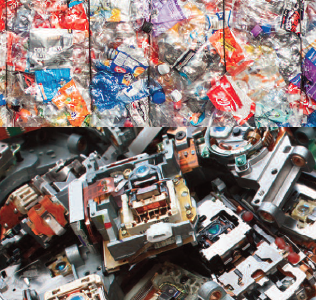Dutch national Circular Economy Policies & Programs
In the Netherlands the urgency of a transition to a circular economy is noted. Therefore a government-wide ambition has been formulated as a guiding vision.
In October 2016 the governmental program A Circular Economy in the Netherlands by 2050 was launched. In this program a nationwide plan is drawn up by multiple departments, to function as a vision for the successful implementation of the circular economy. The goal formulated in this report is to reduce the amount of primary resources used in the Netherlands by 50% in 2030, and to become completely circular by 2050.This can be accomplished through resource efficiency, a shift to renewable and recycled resources, and creating new markets and business models. The summary of the program can be found here.
The program was followed by the development of Transition Agendas and an implementation program. In February 2023 a new National Circular Economy Program for 2023 – 2030 was launched (read more below).
Transition agendas (2018)
The Dutch government has selected five economic sectors and value chains that will be the first to switch to a circular economy: Food and Biomass, Plastics, Manufacturing, Construction and Consumer Goods. These five priorities are important to the Dutch economy and have a big impact on the environment.
In January 2017 a National Agreement on the Circular Economy (Letter of Intent) to develop transition agendas was signed by the Dutch government and a variety of partners.
Transition agendas have been developed for all five sectors and were offered to the initiators of the National Agreement on 15 January 2018:
- Transition Agenda Biomass and Food
- Transition Agenda Plastics
- Transition Agenda Manufacturing Industry
- Transitio Agenda Circular Construction Economy
- Transition Consumer goods.
In July 2018, the Dutch government announced its commitments and priorities to support and promote the realisation of the Transition Agendas. A schematic overview of the commitment and priorities of the Dutch cabinet per sector can be found in this leaflet.
Reduce the amount of primary resources used in the Netherlands by 50% in 2030, and become completely circular by 2050.
Goals in 'A Circular Economy in the Netherlands by 2050'
Implementation program 2019-2023
The Circular Economy Implementation Programme 2019-2023 was launched on February 8, 2019.
More details on sectorspecific programmes can be found here:
- Circular Construction Economy
- Circular Manufacturing (in Dutch)
- Circular Consumer Goods (in Dutch)
- Transition Agenda Plastics (in Dutch)
In 2019 PBL Netherlands Environmental Assessment Agency published Outline of the Circular Economy with an inventory of current circular activities and indication of jobs involved.
Find updates and new documents on the dedicated webpage on Circular Economy of the Dutch government.

National Circular Economy Program 2023 – 2030
On February 6, 2023 the National Program Circular Economy (NPCE) 2023 -2030 was launched.
Concrete targets have been formulated and specific policy developed for the most impactful product groups within these chains, namely:
- Consumer goods: electric and electronic goods; packaging and disposables; textiles; furniture.
- Plastics: plastic packaging; plastics in the construction industry; plastics in agriculture.
- Construction: housing; offices and industrial buildings; concrete viaducts and bridges; road surfaces.
- Manufacturing: Capital Equipment; wind farms; solar PV systems; climate control systems.
The general measures in the NPCE are aimed at:
- Reducing the use of raw materials,
- Substitution of raw materials,
- Lifespan extension,
- High-quality processing.
Download the National Circular Economy Programme 2023-2030 Summary
